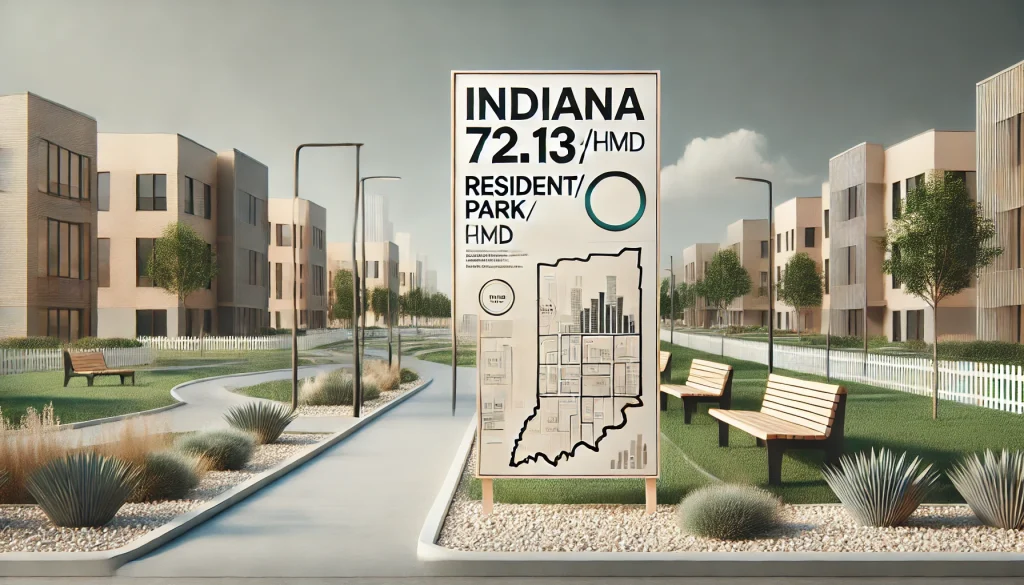Indiana 72.13 pertains to regulations governing resident parks and housing for mobile dwellings (HMDs). This law outlines the rights, responsibilities, and procedures relevant to residents living in mobile home parks or similar settings. Understanding this regulation is crucial for both residents and park operators.
The regulation aims to provide a fair and safe environment for residents. It covers various aspects, including maintenance responsibilities, tenant rights, and the process for resolving disputes. The law reflects the state’s commitment to protecting the interests of residents while ensuring that park operators maintain a high standard of living conditions.
In Indiana, the term “resident park” typically refers to designated areas where mobile homes are situated, allowing residents to live in a community setting. The regulations help ensure that these parks operate in compliance with state standards, providing a framework for both residents and operators to follow.
Overall, Indiana 72.13 plays a vital role in promoting transparency and fairness within the resident park and HMD community, making it essential for stakeholders to be familiar with its provisions.
Key Definitions in Indiana 72.13: Resident Park/HMD
Understanding key definitions in Indiana 72.13 is essential for interpreting the regulations accurately. The term “resident park” generally refers to a location where individuals can reside in mobile homes or manufactured housing. This definition is pivotal in determining the applicability of the law.
Another important term is “HMD” or “housing for mobile dwellings,” which encompasses various living arrangements for mobile homes. This includes both long-term and transient housing options, allowing residents to find suitable accommodations in designated areas.
Additionally, “tenant” refers to individuals who occupy a space in the resident park, while “park operator” denotes the person or entity responsible for managing the park. These definitions establish the framework for rights and obligations outlined in the regulations.
Clarity in these definitions ensures that all parties involved understand their roles and responsibilities, contributing to a harmonious living environment.
Eligibility Criteria for Resident Park/HMD in Indiana
To qualify for residency in a park governed by Indiana 72.13, applicants must meet specific eligibility criteria. One primary requirement is that residents must possess a mobile home that complies with state regulations. This compliance ensures that the homes are safe and suitable for habitation.
Additionally, prospective residents may need to provide proof of income or financial stability. Park operators often seek assurance that tenants can meet their rental obligations and maintain their living arrangements.
- Other Common Eligibility Factors Include:
- Background checks to ensure a safe community environment.
- Compliance with local zoning laws and regulations.
- Submission of a completed application form with all required documentation.
These criteria help maintain a stable and secure living environment for all residents, ensuring that the community remains healthy and well-managed.
Application Process for Indiana 72.13: Resident Park/HMD
The application process for residency in a park covered by Indiana 72.13 involves several key steps. First, applicants must complete an application form provided by the park operator. This form typically requests personal information, details about the mobile home, and financial background information.
After submitting the application, prospective residents may undergo a background check. This step helps park operators assess the applicant’s suitability for residency and ensure a safe living environment for all residents.
Once the application is approved, the new resident will sign a lease agreement outlining the terms and conditions of their residency. This agreement is crucial as it details the rights and responsibilities of both the tenant and the park operator.
It’s advisable for applicants to familiarize themselves with Indiana 72.13 regulations prior to applying. Understanding the rules can help them navigate the process more effectively and ensure compliance with park requirements.
Rights and Responsibilities Under Indiana 72.13: Resident Park/HMD
Under Indiana 72.13, residents of parks have specific rights designed to protect their interests. These rights include the ability to enjoy their homes without undue interference from park operators. Residents can expect a reasonable standard of living, including access to essential services and maintenance of common areas.
On the other hand, residents also have responsibilities. They must adhere to the park’s rules and regulations, which may cover aspects such as noise levels, property maintenance, and community behavior. By following these guidelines, residents contribute to a positive living environment for everyone in the park.
- Key Rights Include:
- The right to fair treatment and non-discrimination.
- The right to privacy within their rented space.
- The right to proper maintenance and repairs from the park operator.
Understanding these rights and responsibilities is vital for fostering a respectful and harmonious community atmosphere, benefiting both residents and park operators.
Common Challenges Faced by Residents in Park/HMD Settings
Residents living in parks governed by Indiana 72.13 often encounter various challenges. One common issue is the lack of communication between residents and park operators, leading to misunderstandings regarding rules and expectations. Clear communication is essential for maintaining a positive living environment.
Another challenge is the potential for disputes over maintenance responsibilities. Residents may feel that park operators are not adequately maintaining shared facilities or addressing necessary repairs. This can lead to frustration and a sense of neglect within the community.
- Other Common Challenges Include:
- Rising rent costs that may outpace residents’ financial capabilities.
- Issues with parking and common area usage.
- Problems related to neighbor disputes and community dynamics.
Addressing these challenges requires effective communication and collaboration among all parties involved, ensuring that the needs of residents are met.
Benefits of Indiana 72.13: Resident Park/HMD Regulations
Indiana 72.13 provides several benefits to residents and park operators alike. One significant advantage is the establishment of clear regulations that promote transparency. By outlining rights and responsibilities, the law helps prevent disputes and misunderstandings.
Additionally, the regulations contribute to a stable living environment by setting standards for park management. This can lead to improved maintenance of facilities, enhanced safety, and a higher quality of life for residents.
- Key Benefits Include:
- Enhanced community cohesion through defined rules and expectations.
- Protection of residents’ rights, ensuring fair treatment.
- Clarity in the application process for new residents.
Ultimately, these benefits foster a more secure and welcoming atmosphere within resident parks and HMDs, encouraging positive community engagement.
Comparative Analysis of Indiana 72.13: Resident Park/HMD with Other States
When comparing Indiana 72.13 with similar regulations in other states, several distinctions emerge. While many states have laws governing resident parks, the specifics of those regulations can vary significantly. Indiana’s approach emphasizes resident rights and operator responsibilities, aiming to create a balanced environment.
For example, some states may have more stringent regulations regarding maintenance and safety standards, while others might prioritize the ease of application for residents. Understanding these differences is essential for stakeholders considering residency in Indiana versus other states.
- Key Comparative Aspects Include:
- Variations in eligibility criteria across states.
- Differences in the rights granted to residents.
- State-specific processes for dispute resolution.
This comparative analysis can help residents make informed decisions about where to live based on the regulatory environment and its implications for their quality of life.
Recent Updates and Amendments to Indiana 72.13: Resident Park/HMD
Indiana 72.13 is subject to updates and amendments that reflect changing societal needs and conditions. Recent changes may include adjustments to eligibility criteria, application processes, or rights granted to residents. Staying informed about these amendments is crucial for both residents and park operators.
Amendments often aim to enhance resident protections and improve living conditions within parks. For instance, recent updates may address issues related to maintenance standards or dispute resolution processes, ensuring that residents receive fair treatment.
- Recent Changes to Monitor:
- Adjustments to rent control measures.
- Enhanced provisions for maintenance and safety requirements.
- Updates on communication protocols between residents and operators.
By remaining aware of these updates, stakeholders can adapt to new regulations and ensure compliance with the law.
Dispute Resolution Processes Under Indiana 72.13: Resident Park/HMD
Indiana 72.13 outlines specific processes for resolving disputes between residents and park operators. These processes are designed to provide a structured approach to addressing conflicts that may arise. Having a clear procedure can help facilitate fair and timely resolutions.
Typically, residents are encouraged to first address their concerns directly with the park operator. Open communication can often resolve issues before escalating them further. If direct communication fails, residents can file a formal complaint through the appropriate channels outlined in the regulations.
- Key Steps in the Dispute Resolution Process:
- Attempt informal resolution through dialogue.
- Submit a formal complaint if the issue persists.
- Participate in mediation or arbitration if necessary.
These processes ensure that residents have avenues for addressing their grievances, promoting a fair living environment within the park.
Community Engagement and Support in Resident Parks/HMDs
Community engagement plays a vital role in enhancing the quality of life in resident parks governed by Indiana 72.13. Active participation in community events fosters a sense of belonging among residents. These events can range from social gatherings to educational workshops focused on tenant rights and responsibilities.
Support networks are also essential in these communities. Residents often form associations that advocate for their rights and work together to address common challenges. This collective effort can lead to improvements in living conditions and enhance communication with park operators.
- Benefits of Community Engagement:
- Strengthened relationships among residents.
- Increased awareness of rights and regulations.
- Enhanced support for addressing issues collaboratively.
By fostering a sense of community, residents can create a more positive and supportive environment for everyone living in the park.
Conclusion: The Impact of Indiana 72.13: Resident Park/HMD on Residents
In conclusion, Indiana 72.13: Resident Park/HMD has a significant impact on the lives of residents living in mobile home parks. By providing clear regulations and guidelines, this law protects the rights of residents and establishes responsibilities for park operators.
Understanding these regulations is crucial for residents to navigate their living situations effectively. It empowers them to advocate for their rights and ensures that their voices are heard within the community.
As Indiana continues to evolve its regulations, staying informed about changes is essential for residents and park operators alike. The ongoing dialogue and engagement fostered by these regulations can lead to stronger communities and better living conditions for all.


